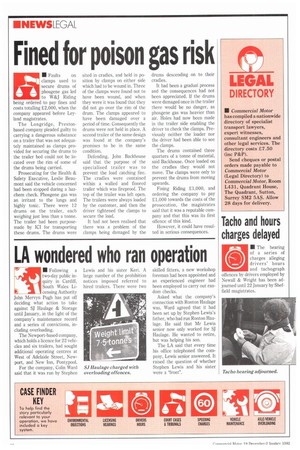Fined for poison gas risk
Page 12

If you've noticed an error in this article please click here to report it so we can fix it.
• Faults on clamps used to secure drums of phosgene gas led to W&J Riding being ordered to pay fines and costs totalling £2,000, when the company appeared before Leyland magistrates.
The Longridge, Prestonbased company pleaded guilty to carrying a dangerous substance on a trailer that was not adequately maintained as clamps provided for securing the drums to the trailer bed could not be located over the rim of some of the drums being carried.
Prosecuting for the Health & Safety Executive, Leslie Beaumont said the vehicle concerned had been stopped during a hazchem check. Phosgene gas was an irritant to the lungs and highly toxic. There were 12 drums on the trailer, each weighing just less than a tonne. The trailer had been purposemade by ICI for transporting these drums. The drums were
IN,
6 6
sited in cradles, and held in position by clamps on either side which had to be wound in. Three of the clamps were found not to have been wound, and when they were it was found that they did not go over the rim of the drum. The clamps appeared to have been damaged over a period of time. Consequently the drums were not held in place. A second trailer of the same design was found at the company's premises to be in the same condition.
Defending, John Backhouse said that the purpose of the specialised trailer was to prevent the load catching fire. The cradles were contained within a walled and floored trailer which was fireproof. The top of the trailer was left open. The trailers were always loaded by the customer, and then the driver tightened the clamps to secure the load.
It had not been realised that there was a problem of the clamps being damaged by the drums descending on to their cradles.
It had been a gradual process and the consequences had not been appreciated. If the drums were damaged once in the trailer there would be no danger, as phosgene gas was heavier than air. Holes had now been made in the trailer side enabling the driver to check the clamps. Previously neither the loader nor the driver had been able to see the clamps.
The drums contained three quarters of a tonne of material, said Backhouse. Once loaded on the cradles they would not move. The clamps were only to prevent the drums from moving upwards.
Fining Riding £1,000, and ordering the company to pay £1,000 towards the costs of the prosecution, the magistrates said that it was a reputable company and that this was its first offence of this kind.
However, it could have resulted in serious consequences.




























































































